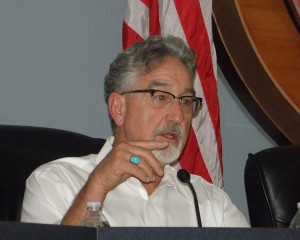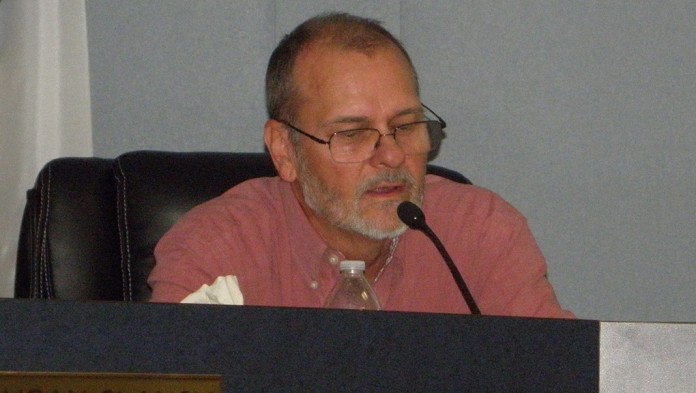CAVE CREEK – With Councilman John Ford and Town Manager Peter Jankowski absent, Mayor Vincent Francia began Monday’s council meeting by reminding everyone of the upcoming Taste of Cave Creek event Oct. 19 – 20 at Stagecoach Village.
During Call to the Public, Maricopa County Sheriff’s Office Capt. Kip Rustenburg also reminded citizens of the Public Safety Fair this Saturday from 10 a.m. – 2 p.m. at the church on the corner of Carefree Highway and Central Avenue.
Francia asked council to continue two items on the agenda pertaining to Cahava Springs.
Francia said after speaking to mayor-elect Ernie Bunch, who raised some valid questions, he pointed out the town code requires agenda items be made available by the Tuesday prior to the meeting.
He said they didn’t receive some of the items until Thursday and because town hall is closed on Fridays, the information wasn’t available until Monday.
Council voted unanimously to continue the items until the Oct. 17 meeting.
Francia introduced the next item, an IGA (intergovernmental agreement) between the town and the state land department.
He said Steve Betts had a medical matter he needed to tend to and couldn’t be there that evening.
Town Attorney Bill Sims said it was unusual that the land attorney from the attorney general’s office contacted him to get things moving and called the IGA the “logical next step” to determine if the 4,000 acres of state land can be preserved.
The IGA commits the town and AG’s office to $20,000 each to perform a biological assessment of the land.
During public comment, Kerry Smith stated, “I would delay consideration of this agreement until we hear from Mr. Betts” and said he thought it would be helpful to see the full report.

Smith noted the mitigation program the town wishes to pursue falls under the Clean Water Act (CWA) and said, “The CWA requires there be water involved.”
Bill Allen said he concurred with what Smith said and stated he wasn’t sure why a developer would want to donate land to the town.
Katya Kincel urged council to listen to Smith and Allen, whom she said had “incredible knowledge.”
She said the resolution says the town will be able to protect property from development, questioned what property it was referring to and asked if any council members knew what a conceptual mitigation plan is.
Kincel asked, “Have y’all been briefed by this Mr. Betts putting this together?”

Allen asked to speak again and clarified the federal government’s definition of navigable waters includes anything that has banks, which can be considered a stream.
In response to public comments, Sims explained developers would not be buying land twice and many of the questions people have will be answered in the mitigation plan, which will have to come back to council for approval.
Vice Mayor Steve LaMar moved to pass the resolution approving the IGA and stated developers would not be buying land up here and down there, referring to the Desert Ridge area the state land department is interested in auctioning off for development.

He said, “I thought everyone knew the land we’re talking about is the 4,000 acres of state land,” adding, “It could be a place where endangered species could be relocated.”
LaMar pointed out all the parties involved believe this is a great idea but it will all depend on what the biological survey says.
He said, “This is just the first step to determine if the land will support what we think is a good idea.”
LaMar said council is not looking at a property tax and never has.
He stated, “No one is trying to hide anything, but this is the next step.”
Councilman Dick Esser stated he supported the motion and, after noting all the years he’s worked with the U.S. Army Corps of Engineers, said, “They are not an easy agency to work with.”
Councilman Thomas McGuire thanked Allen for defining navigable waters.
Bunch said, “It’s been a long road and this is just another step in the journey.”
Councilwoman Susan Clancy said she supported the motion wholeheartedly and hopes it works out.
Francia said the key word is “next step.”
He said the state land department, when it entered into the development agreement with the town, gave the 20 years to come up with a plan to preserve the 4,000 acres.
Francia pointed out this was the first time in his 16 years on council that he’s seen the state move this quickly.
He said what Spur Cross taught us was, if the town were looking for a brand, it would be preserving the desert.
The motion passed unanimously.
The final agenda item was about imposing a moratorium on any new Desert Hills water accounts.
Francia said the town manager, concerned about the town’s water CAP water allocation, sought direction from council, including a number of scenarios, which, during a recent work study session, council felt it didn’t have enough information.
During public comment, Allen called the restrictions draconian, stating citizens, if refused service, could put in their own wells, which he said could be devastating to the water table.
Allen said there are other options, which the Water Advisory Committee (WAC) has discussed, and stated, “I’m sorry the WAC was not asked.”

He also noted 386 acre feet of water was originally designated for Desert Hills Water and said he doesn’t think now is the time to consider selling Desert Hills Water Company.
Smith said the town is currently sending 404 acre feet to Desert Hills from the town’s 2,600 acre feet allocation and said it was his understanding that once they give 404 acre feet they can’t take it back.
He questioned whether the 386 acre feet could displace the 404 acre feet.
Smith said the town could always buy water rights from Native American communities and bring it to the area.
He said any further extraction of ground water could affect existing wells.
Reg Monachino stated the moratorium is a stop-gap measure that preserves some of Cave Creek’s water and while the moratorium is in effect the town can develop a plan.
Kincel stated when the town bought the water company they were told the companies would be kept separate.
She said, “If you did that you wouldn’t be in this predicament.”
Francia said the town manager was concerned, as was he, that the CAP allotment was in jeopardy and that’s why the item was brought forward.
Ridiculing certificates for a 100-year assured water supply, Francia said the next time someone’s thirsty he hopes they like the taste of paper.
LaMar said a moratorium was the proper step to take now.
Bunch explained briefly why the town purchased the Desert Hills Water Company and said the arsenic levels in the water required the town to blend it with CAP water.
Esser said the resolution for the moratorium was due to lacking enough information on some of the issues raised during the work study session.
The resolution passed unanimously.





